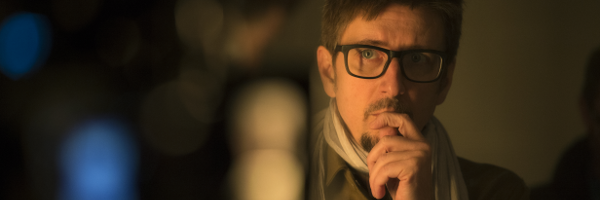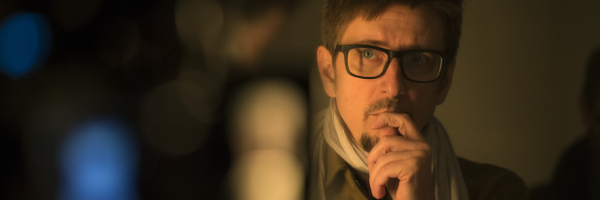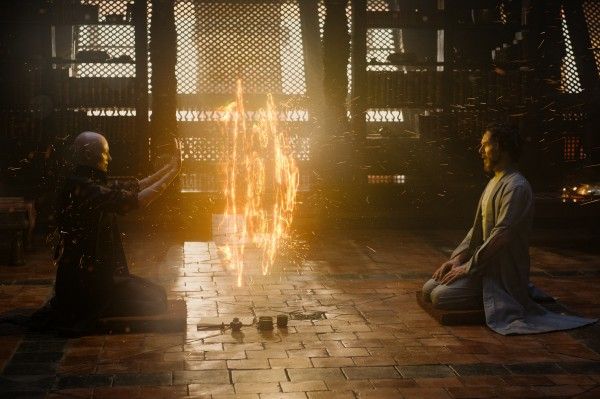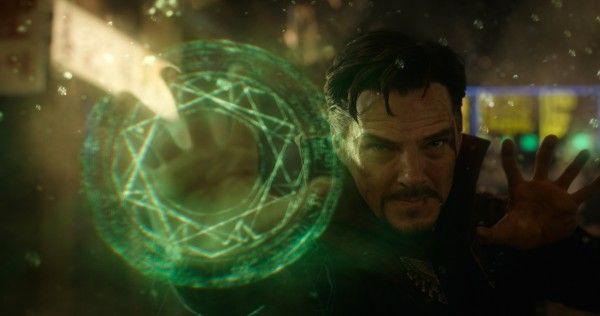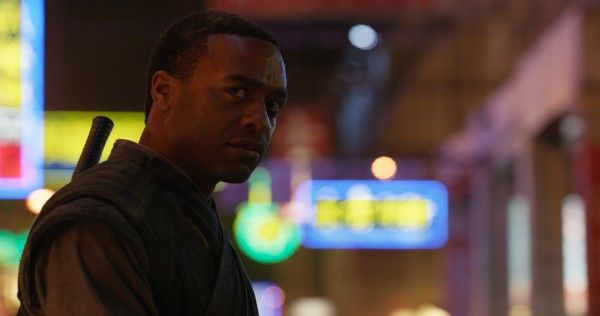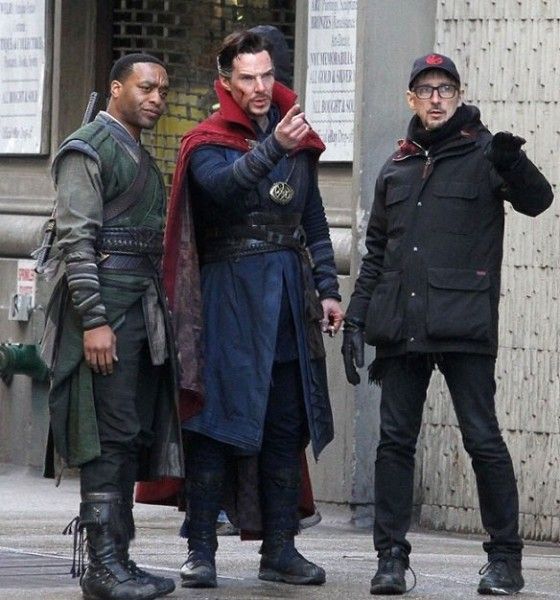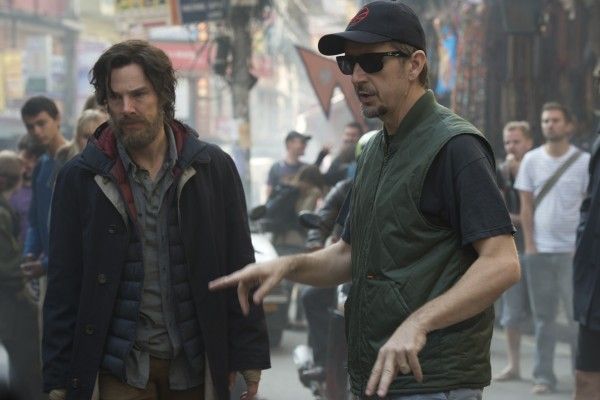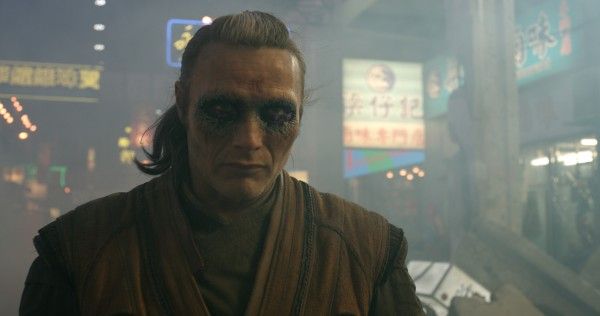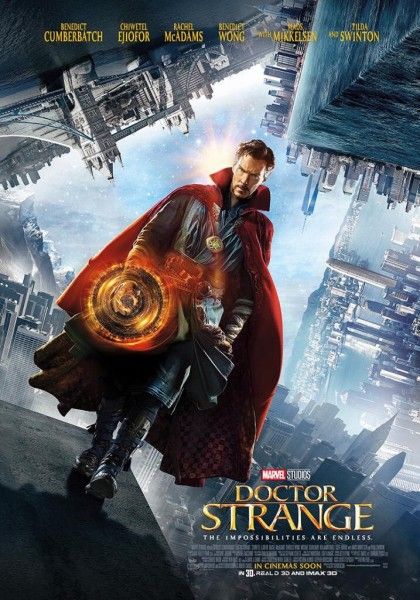You might not expect a director best known for scaring the pants off audience with films like Sinister and The Exorcism of Emily Rose to be a natural fit for Marvel's mass-scale, mass-appeal superhero universe, but if you ask studio head Kevin Feige it's exactly that background that made Scott Derrickson the right guy for the job. Not because their latest headlining hero is stepping into the world of horror -- obviously that's not happening -- but because Derrickson has a knack for keeping one foot grounded in reality while the other dances in the realm of the supernatural.
That's exactly what it's going to take to pull off Doctor Strange, the story of a brilliant neurosurgeon who seeks out some seriously unorthodox means of medical assistance after his million dollar hands are destroyed in a devastating car accident. That quest leads him to the Kamar-Taj, The Ancient One, and eventually the title of Sorcerer Supreme when Strange becomes world's most skilled spell-slinger. It's a story about loss and loneliness, a character that comes out of the fire forged in a stronger mold than when he went in, and it's one Derrickson is taking seriously as the helmer of the latest ship to join Marvel's ever-growing fleet.
Earlier this year, I joined a number of journalists on the set of Doctor Strange at the Longcross studios just outside of London and we had the opportunity to chat with Derrickson about his vision for the film during some downtime in production. Derrickson talked about his passion for preserving the magic of Doctor Strange's world, what he learned from Harry Potter and what he's specifically avoiding, taking inspiration from martial arts films, why Doctor Strange is more like Winter Soldier than Guardians of the Galaxy, what he's drawing on from the comics, why Doctor Strange is the only superhero he feels personally suited to take on, and a whole lot more. Check out the full interview below.
I have a super specific question. Are there any Bob Dylan songs in this movie?
SCOTT DERRICKSON: Are there any what?
Bob Dylan songs.
DERRICKSON: Oh God, I hope, I hope so. That's my answer to everything. I hope there are Bob Dylan songs in every movie. So yeah. No, we are, we're looking at specific songs and some of them classic songs. We'll see which ones we'll get. Which ones we can afford and which ones we can get the rights to.
When you come on to a movie like Doctor Strange where Marvel obviously has an idea of what they want it to be, how much development are you doing from the start? Like how much are you building this movie from the ground up compared to a movie that you're doing outside of this kind of thing?
DERRICKSON: In terms of adapted material, which I've done before a couple of times, the development process was even more from the ground up in this case. Yeah, they, because you have a large body of stories and material from the comics. And when I first met with them, they had certain thematic ideas they liked. And not a lot of story ideas, which was great. And I think it was my connection and interest in the thematic ideas that got me the job. And the whole process was starting with all ideas on the table. And so I was involved in it from the very get-go.
How has it been so far? Has it surprised you?
DERRICKSON: It's been incredible. It's been the most incredible filmmaking experience for me by far. Yeah, it’s — I mean, for a variety of reasons. The experience with Marvel, you know, I can only speak for myself. I know every director has their own stories. But my experience with Marvel has been really good. And I really enjoy the intimacy of the collaboration because it's all been just myself and Kevin and my producer Stephen. There are no middlemen. It's that and my crew. And there's that's it. There's no one else working on the movie. And that's new for me and unique for me.
And the ambition of the movie, I'm surprised that I'm getting to make it. Because I keep feeling like these set pieces are — someone's gonna say, “It's too bizarre. It's too weird. We can't, it's too, we're going too far.” And I feel as though we crossed a line at some point in the process, which the comics I think were the inspiration to try to go past certain boundaries. But we crossed a line and after crossing that line we just kept going. It all kept getting stranger and stranger not to be, I didn't mean that as a pun, but it all just kept getting more bizarre. And in a good way, in a way that as a viewer I think I would be satisfied by.
Kevin said that one of the hardest nuts to crack with the movie was to figure out how to make the action sort of believable and different because you're just sort of conjuring spells and things of this nature. Can you talk about what the action's gonna look like and how you sort of cracked that?
DERRICKSON: Yeah, it was the idea of magic, preserving the idea of magic was really important to me that we didn't try to explain it away or root it all in something scientific that by definition is not magic to me. And we, the, there's also the burden of popular magic movies, the Harry Potter series, the Lord of the Rings, which appropriate magic in a very familiar, traditional way. And the comics had a few ideas in them that were to this day still very original. Those ideas we're using and the rest of it was also was very traditional in the use of spells and even some of the imagery. So my, for me the starting point was what kind of things have we not seen in cinema? That we could, was almost working backwards. What kind of imagery, what kind of action could be created in cinema that we haven't seen? And I started from that place and looked for a way to tie that in to magic. And some of those ideas didn't tie in well and some of those ideas tied in surprisingly well. The ones that tied in really well, those became the major set pieces for the movie.
This morning we asked Kevin what sort of subgenre this movie falls into. And he said supernatural, which feels very vague. But just from what we've been able to sort of see, it looks like sort of like a martial arts movie in a way. I mean, is there like a heavy martial arts movie influence here?
DERRICKSON: Yeah. There's definitely a martial arts influence on the movie. Because that is the action that I like for starters. It is also the martial arts, martial arts is the kind of action that does tie in well to the supernatural. There's a whole, that is a whole subgenre within martial arts cinema. The supernatural martial arts movie. Particularly within Asian cinema. And I felt like when it came to fighting in the movie that just made sense to certainly to go in that direction and stay away from gunfire and things like that.
And to avoid having fighting be the casting of bolts of light. I just, you know, that was another thing where I feel like I really feel like magic has been, we've been drawing on the Emperor in Star Wars for over 30 years, and so we gotta start doing this some other way -- the magic power, the utilization of magic power. But yeah, it's there's some good fighting in it. But that fighting is again, always within a context of something I think more fantastical and more surreal and more mind trippy than just the supernatural action of combat. That's I think that's it's always supernatural action, combat, fighting within a larger surreal canvas. That was the thing I always wanted to preserve so that we're never just watching fighting.
I've seen on your Twitter feed lots of great art, well actually Ditko art and a lot of stuff. When you're adapting a story like this and so much lore and so much visual cues from the comics, what is the most important personally? What did you really wanna make sure what was in this film, whether it's a set piece, design, or something like that?
DERRICKSON: That's a great question. That's a really incisive question. For, I mean, my love for the comics I think is probably I'll start by saying this. I think that 'cause I love the comics so much and I grew up reading Marvel Comics. And Doctor Strange is my favorite comic book character probably I think honestly the only comic book I would feel personally suited to work on. And for me, my long standing love for Doctor Strange comes from first of all, the fantastical visual imagery of all the comics, particularly the early Ditko stuff, Into Shamballa, The Oath, a lot of the images that I have picked are from those three sources. And then individual issues.
Thematically the loneliness of that character, I always really liked the idea of a character who had gone through so much trauma and was placed into a position between our world and other worlds, other dimensions literally. That's a lonely position. I like that. But I think my that as I've gotten older, my continuing love for Doctor Strange has been that he is a character who transforms through suffering. He goes through this gauntlet and for me that's kind of the most powerful thing. He goes through this gauntlet of trauma and suffering, going all the way back to his childhood in the comics. But then he appropriates that suffering in a certain way that limits him. And then he goes through the loss of everything in a really painful, unbearable way. And eventually finds self-transcendence in something mystical.
That's Doctor Strange, and I love that. And I think that again, in getting to why I think I got the job, I think it's my genuine love for that. That was that somehow connected to what I didn't know it at the time, but I think it really connected to what Marvel wanted the movie to be. And when I came in, I talked about Doctor Strange in those terms and for me it's like that's the only way I could make the movie. You know, that and I had set piece ideas already about how to make the movie as weird, as visually weird in this day and age as the Ditko comics were at their time.
Is there a sense of humor to it as well?
DERRICKSON: Yeah.
Where does that--?
DERRICKSON: It's Benedict, how can it not be funny, you know?
By playing it straight it's funny or is he--?
DERRICKSON: I mean, it's he's yeah, I mean, he's just he is a funny guy. And there's funny lines in the script. There's comedy in it. But it's not Guardians. It's not that tone by any means. It's closer to Winter Soldier, which has comedy in it and has some really funny lines in it. That I love, I just named my two favorite Marvel movies by the way. And part of my love for Winter Soldier is the high impact, grounded nature of the action in that movie. And the subversive grounded ideas of that movie within what is just one of the great kickass action movies. Like that's what I love about Winter Soldier in a nutshell. So we have a lot of humor spread throughout, but it is a very grounded, realistic movie about a guy who suffers a lot. And transforms. So there's also it's also very dramatic. Yeah.
We heard a little bit about some of the weapons and artifacts and how deeply connected they are because they work in certain dimensions and don't and that's about all we heard. So what can you tell us about that and how much of those are being pulled right out of the comics? 'Cause obviously the Eye of Agamotto is there, but…
DERRICKSON: Yeah. It's you have to, we there was a lot of discussion about how much to use, because you can obviously get into an overload of those things. But I think the Harry Potter movies are proof that audiences love that stuff. They love the idea of magical objects and they like learning the rules of those objects and what they do. I think everything that we do, I think all the names of everything and I think all the things that we use in the movie are drawn from the comics. I can't think of one at least offhand that's not drawn from the comics. Yeah.
The Sling Rings?
DERRICKSON: That — okay, there's that, yeah. Well done. But the gateways, the forming of the gateways that are used for that, that's straight out of the comics. Yeah. I just needed an object for them to carry it on. Yeah, okay. Well done.
You're sitting in a room full of people who are like professional nerds.
DERRICKSON: Yes.
And a number of us had to look up your main antagonist, Kaecilius, in this movie.
DERRICKSON: I love that.
He is a very not very well known character.
DERRICKSON: Yeah.
Can you talk about the decision to use that character and why you guys ended up there and what to expect from?
DERRICKSON: Yes. I'm trying, I don't know how much I can't give away about this, so what I'll say is that I'll, I'm gonna answer with a tease. Is that fair? What we wanted was a character that was rooted in the real. This is certainly what I was pitching from the beginning was an antagonist who was rooted in the real world who had, so that there could be an intimate relatability between Strange and his adversary. But who was empowered by something else. By something otherworldly. And connected to something else otherworldly. Which comes straight from the comics.
Another character straight from the comics. And that was, that became interesting to me. I always loved, I mean, the Sauron-Saruman idea in Lord of the Rings, even though you never see Sauron except I think in the prologue. I think that's the only time you ever see him in that trilogy, but what a presence and what a power. And we do more than that with this other dimensional power. But it, I like that idea. So that Strange wasn’t combating something huge and fantastical all the way through the movie that had no human relatability. That the one every version of that that we would visit felt strained and felt like too high of a bar. That we wouldn't clear that bar given everything else that we had to establish in the movie. Does that make sense? And I think it's working really well. And the thing I'll say about Kaecilius that is my favorite thing about him is he is a man of ideas. And that's to me what always is compelling about villains. I am much more interested in how they think than in what they even do. My favorite villain being John Doe in Seven. Who does these extraordinary things and is so scary, but the scariest scene is when he actually, for me the scariest scene in that movie is the ride into the desert when he articulates why. I got terrified, I felt nauseous watching that movie, because I was like oh my God, he makes sense. Oh my God, how can this be? And it was that watertight logic of what he says. Same thing with The Joker in The Dark Knight. The watertight logic of his anarchistic philosophy in that hospital bedside table scene with Harvey Dent is awesome. So I'm not saying our villain is as great as John Doe or The Joker, as Heath Ledger's Joker, but he is a man of ideas and to me that's what makes villains compelling.
You mentioned your passion for the character and his history, but you guys all seem to be making some interesting evolutions in storytelling in terms of the characters of Wong and Baron Mordo. Can you talk a little about the decision there to have them sort of not playing their sort of typical comic book roles?
DERRICKSON: Yeah, the, I mean, in the case of Mordo, in the comic books, that character was just really arch. Just really arch and he's in the origin issue and even in reading through and I've read the entire body of Doctor Strange now. And there was a -- it was a difficult character, very difficult character to adapt. Because of the very basic archness that he plays all the way through there. So we wanted to keep what were the interesting aspects of him, his relationship with The Ancient One, but the only way that Mordo who needs to be a presence in the universe of Doctor Strange and God willing in sequels, I felt that we had to start by establishing who he was before he got into that arch villainy in the comics. And that's a lot of what we're doing in this movie is we're sort of building a foundational understanding of who he was before the guy that you met in that comic so that that turn isn't an arch turn.
Wong is another thing all together, because there's, you know, it's a racial stereotype. I mean, let's be blunt about it. As is The Ancient One. But Wong, even more than The Ancient One I think, was a character that there just wasn't a lot that was fundamental about his character that was usable. And so instead of being a sidekick, he's a master of the mystic arts. Instead of being a manservant, he oversees the library at Kamar-Taj and is an intellectual mentor to Strange. So we kind of flipped everything that he was. And that's where it's related to the comics in that we took the things that were in retrospect insulting and elevated them in just the same way. And that became suddenly ah, this is a great character. And that seemed to work and has relatability only in that we basically inverted what his character was and then kept the name, kept him Chinese. Other than that, that's about it I think to be honest.
For more of our coverage from the set of Doctor Strange, check out the links below.
- ‘Doctor Strange’: Why the Sorcerers of the Kamar-Taj Haven’t Intervened in the MCU Until Now
- ‘Doctor Strange': Benedict Cumberbatch on His Strange Journey to Becoming the Sorcerer Supreme
- How ‘Doctor Strange’ Is Handling Magic and How it Ties in with The Quantum Realm
- Kevin Feige on Why 'Doctor Strange' Has the Most Interesting Character Arc since Iron Man
- 'Doctor Strange': New Character Posters Introduce the Sorcerers of the Kamar-Taj
- 'Doctor Strange': 45 Things to Know About Marvel's Biggest Spectacle Yet

